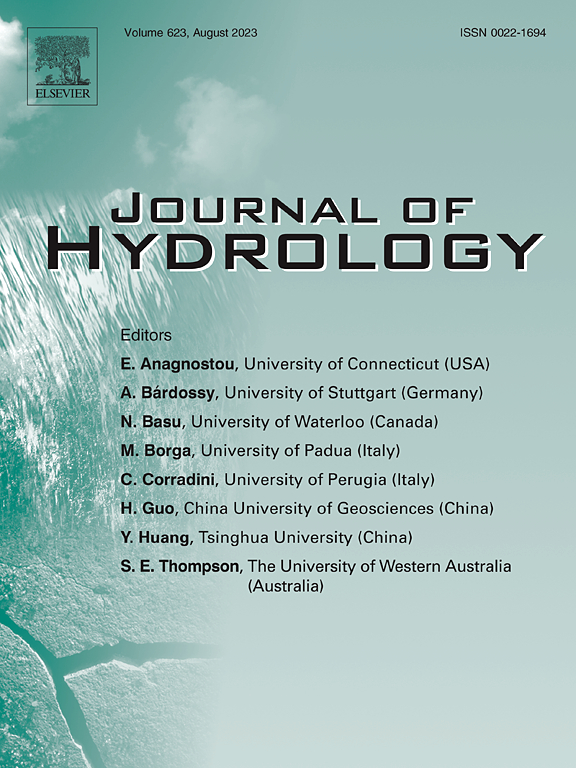根据 CMIP6 迫变情景评估陆地蓄水对干旱的稳定性
IF 5.9
1区 地球科学
Q1 ENGINEERING, CIVIL
引用次数: 0
摘要
评估干旱条件下陆地蓄水(TWS)的稳定性对于水资源的可持续发展至关重要。在本研究中,我们整合了耦合模式相互比较项目第六阶段(CMIP6)的五种不同情景(历史情景、SSP1-2.6情景、SSP2-4.5情景、SSP3-7.0情景和SSP5-8.5情景)的地表温度(ST)、叶面积指数(LAI)和降水量(P)数据,建立了标准化温度植被降水指数(STVPI)。然后利用该指数监测全球干旱状况,并研究 TWS 对干旱灾害的稳定性。结果表明,STVPI 不仅能监测气象干旱,而且对植被稀疏导致的干旱具有显著的敏感性和适用性。值得注意的是,在 SSP1-2.6 情景下,全球 21.16% 的陆地面积将出现干旱趋势,而在 SSP5-8.5 情景下,这一比例将上升至 35.81%,这凸显了全球持续变暖和排放升级可能导致全球受干旱影响地区的扩大。此外,研究结果还发现,海拔较低的暖温带和热带地区在维持 TWS 稳定性方面具有优势。遗憾的是,未来撒哈拉沙漠西部、中国中部和美国北部地区 TWS 对干旱的稳定性将下降,这些地区将面临严重的水资源危机。该研究框架为深入评估和科学分配气候变化下的水资源提供了重要参考。本文章由计算机程序翻译,如有差异,请以英文原文为准。

Assessing the stability of terrestrial water storage to drought based on CMIP6 forcing scenarios
Assessing the stability of terrestrial water storage (TWS) under drought conditions is critical for the sustainable development of water resources. In this study, we integrated surface temperature (ST), leaf area index (LAI), and precipitation (P) data from five different scenarios (History, SSP1-2.6, SSP2-4.5, SSP3-7.0, and SSP5-8.5) of the Coupled Model Intercomparison Project Phase 6 (CMIP6) to develop a standardized temperature vegetation precipitation index (STVPI). The index was then utilized to monitor global drought conditions and investigate the stability of TWS to drought disaster. The results showed that STVPI can not only monitor meteorological drought, but also has a remarkable sensitivity and applicability to drought caused by sparse vegetation. Notably, 21.16% of the global land area will have a drought trend under the SSP1-2.6 scenario, while it will rise to 35.81% under the SSP5-8.5 scenario, which underscored the potential for an expansion of drought-affected regions worldwide as a result of ongoing global warming and escalating emissions. In addition, the results also found that the warm temperate and tropical regions at lower elevations have an advantage in maintaining the stability of TWS. Unfortunately, the stability of TWS to drought will decline in the western Sahara Desert, central China and northern United States in the future, where will face a serious water crisis. The research framework provides an important reference for deeply evaluating and scientifically allocating water resources under climate change.
求助全文
通过发布文献求助,成功后即可免费获取论文全文。
去求助
来源期刊

Journal of Hydrology
地学-地球科学综合
CiteScore
11.00
自引率
12.50%
发文量
1309
审稿时长
7.5 months
期刊介绍:
The Journal of Hydrology publishes original research papers and comprehensive reviews in all the subfields of the hydrological sciences including water based management and policy issues that impact on economics and society. These comprise, but are not limited to the physical, chemical, biogeochemical, stochastic and systems aspects of surface and groundwater hydrology, hydrometeorology and hydrogeology. Relevant topics incorporating the insights and methodologies of disciplines such as climatology, water resource systems, hydraulics, agrohydrology, geomorphology, soil science, instrumentation and remote sensing, civil and environmental engineering are included. Social science perspectives on hydrological problems such as resource and ecological economics, environmental sociology, psychology and behavioural science, management and policy analysis are also invited. Multi-and interdisciplinary analyses of hydrological problems are within scope. The science published in the Journal of Hydrology is relevant to catchment scales rather than exclusively to a local scale or site.
 求助内容:
求助内容: 应助结果提醒方式:
应助结果提醒方式:


